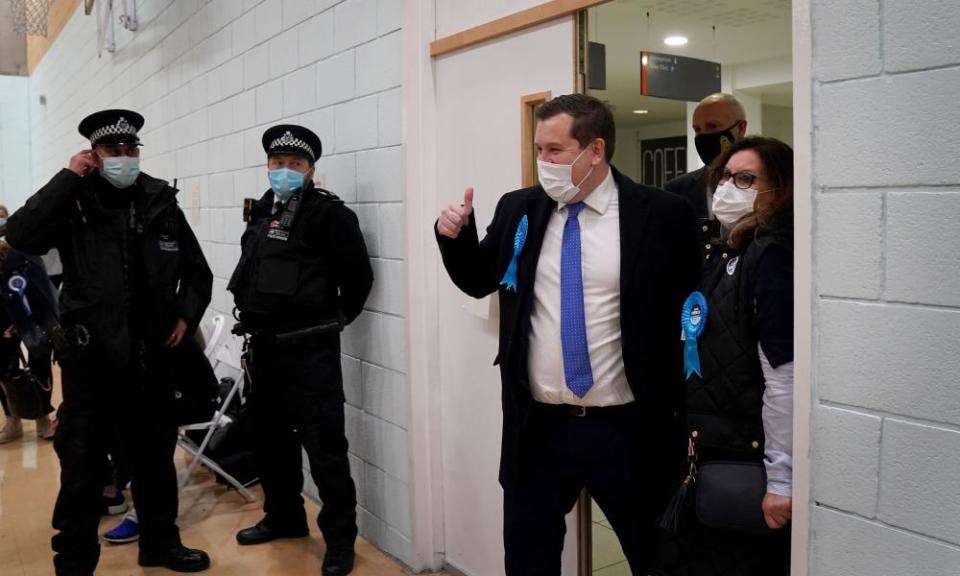The Tories might have won Bexley – but they’re worried about the rise of Reform

There will be relief in party headquarters that Nigel Farage has retired to the broadcasting studios
The Conservative hold in the Old Bexley and Sidcup byelection has both sides claiming victory. Senior Tories point to the fact that their party held the seat with more than 50% of the vote share as proof of success. Labour politicians claim the 10-point swing towards the opposition is evidence that the party is “back in business”. The truth is more complicated than either side’s spin, though.
Ahead of the vote – triggered by the death of former cabinet minister James Brokenshire – ministers were confident they would hold the constituency, which has long been seen as a safe seat. However, the fact that the majority was reduced from 19,000 to less than 5,000 and voter turnout is at 34% means this isn’t a win that will lead to a party atmosphere at Conservative campaign headquarters.
Instead, there are lessons to draw from it for future votes. The poor turnout – the lowest at a byelection since 2018 – hasn’t surprised those sent to the seat to campaign. While members of government were confident of a win, there was a sense that there was a lack of enthusiasm among the core base.
“People will come out for us, but they are doing so begrudgingly,” said one senior Tory ahead of the vote. Weeks of negative stories – from the Owen Paterson sleaze row to Boris Johnson’s rambling speech to the CBI – mean that the Tory grassroots is feeling deflated.
What points to potential issues for the Tories in the future is who benefited. For now, the fact that the Labour vote share went up by 7.4 points, while Reform UK won 6.6%, means that the opposition vote was split. That Reform’s leader, Richard Tice, only got 6.6% is a reminder of how lucky the Tories are that Nigel Farage has retired to the comfort of the broadcasting studios. It is not hard to imagine the trouble he would have caused in a seat such as this after the month the government has had.
As the Channel crossings gain more coverage, one of the biggest worries in CCHQ about the next election is that a party will emerge that will outflank them on the right. While Labour has recently pulled level with the Tories in the polls, government advisers are sceptical of the idea that Keir Starmer can win much ground over immigration, given that Labour’s own approach isn’t clear-cut.
However, were a Farage-style party to hammer the party on this, there could be a world where the Tories lose a chunk of their vote to the right, which would allows Labour to become the largest party without making much progress from where it is now.
In the short term, the byelection result will increase Tory nerves over the next one, in North Shropshire later this month. That vote was already viewed as the trickier of the two, even though the Conservatives have a majority of more than 20,000 in the rural seat.
Despite this being Owen Paterson’s old seat, sleaze is not dominating. Tories and Liberal Democrats campaigning there both say it doesn’t come up much – instead one Lib Dem says that “Peppa Pig” is a more regular complaint on the doorstep, a reference to Johnson’s CBI speech.
But what worries the Tories is that the seat is so safe that they don’t have data about where their voters are, and the distance from London makes it hard to get cabinet ministers there for profile-raising visits. Meanwhile, the Liberal Democrats are on the offensive – pouring resources into the seat and claiming it as neck-and-neck, with one senior Lib Dem betting on a win.
A Tory loss in North Shropshire would still be a surprise. But a byelection nine days before Christmas with a demoralised Tory base is not a recipe for festive cheer: if the Tories don’t hold it, it won’t be the season of goodwill for Boris Johnson among Tory MPs.
The prime minister can’t afford for the fortnight ahead of the vote to be dominated by more stories about parties in N0 10 or contradictory advice about just how normal this Christmas will be. The government will try to get back on the front foot next week with announcements on crime and the nationality and borders bill. Johnson needs these to go well if he is to ensure that there’s no unpleasant Christmas surprise for him and his party.
Katy Balls is the Spectator’s deputy political editor

 Yahoo Finance
Yahoo Finance 